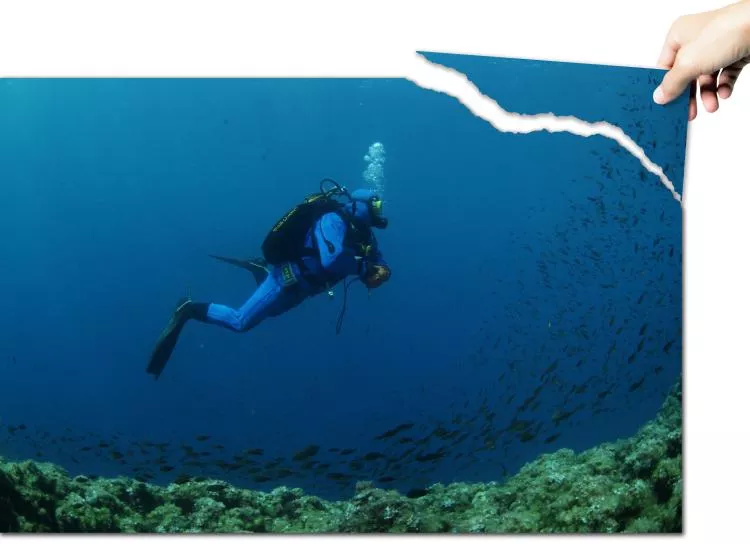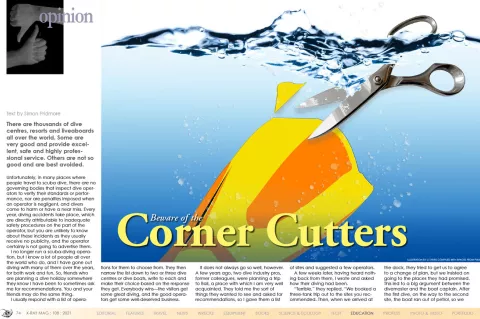There are thousands of dive centres, resorts and liveaboards all over the world. Some are very good and provide excellent, safe and highly professional service. Others are not so good and are best avoided.
Contributed by
Unfortunately, in many places where people travel to scuba dive, there are no governing bodies that inspect dive operators to verify their standards or performance, nor are penalties imposed when an operator is negligent, and divers come to harm or have a near miss. Every year, diving accidents take place, which are directly attributable to inadequate safety procedures on the part of the operator, but you are unlikely to know about these incidents as they usually receive no publicity, and the operator certainly is not going to advertise them.
I no longer run a scuba-diving operation, but I know a lot of people all over the world who do, and I have gone out diving with many of them over the years, for both work and fun. So, friends who are planning a dive holiday somewhere they know I have been to sometimes ask me for recommendations. You and your friends may do the same thing.
I usually respond with a list of operations for them to choose from. They then narrow the list down to two or three dive centres or dive boats, write to each and make their choice based on the response they get. Everybody wins—the visitors get some great diving, and the good operators get some well-deserved business.
It does not always go so well, however. A few years ago, two dive industry pros, former colleagues, were planning a trip to Bali, a place with which I am very well acquainted. They told me the sort of things they wanted to see and asked for recommendations, so I gave them a list of sites and suggested a few operators.
A few weeks later, having heard nothing back from them, I wrote and asked how their diving had been.
“Terrible,” they replied. “We booked a three-tank trip out to the sites you recommended. Then, when we arrived at the dock, they tried to get us to agree to a change of plan, but we insisted on going to the places they had promised. This led to a big argument between the divemaster and the boat captain. After the first dive, on the way to the second site, the boat ran out of petrol, so we spent an hour bobbing around in high waves, waiting for someone to bring out a jerry can. The lost time meant that we only did two dives instead of three. We asked for a refund, but they refused and blamed us for the problems they had experienced. Oh yes, and while we were hanging out in mid-ocean trying to avoid being sick and getting sunburnt (the boat had no shade), we were chatting with the divemaster, and he admitted that he had actually never been out to these sites before. Nor was he really a divemaster. Our trip was actually part of his divemaster training. The whole thing was a dreadful experience.”
I was horrified and asked them which of the operators I had suggested was responsible for this disastrous day. The answer came back. “Oh, none of them,” they said. “All the people you recommended were nice enough, but they were all really expensive. So, we decided to wait until we got to Bali before deciding. Then, soon after we arrived, we met a really friendly guy on the beach. We told him what we wanted to do, and he offered us a great deal. We even checked out his website and everything looked OK, so we went for that instead. But the trip turned out to be not at all what we were promised.”
The corner cutters
Everywhere in the world, scuba diving businesses that run their dive trips properly have similar costs, work on a similar profit margin, and ask a similar price. Therefore, if you are offered a trip for significantly less than the going rate, it is highly likely that there will be something missing. Corners will have been cut somewhere. You get what you pay for and, if you pay less, you will get less.
This is not to say that all cheaper operators are cheats. With the honest ones, it is easy to see where they are economising, and they will readily point this out if asked. For instance, liveaboard cabins may have bunks instead of double beds and buffet lunches instead of à la carte meals. Land-based dive centres may be using ancient trucks instead of comfortable passenger vans and have rusty, faded old gear for rent instead of new models. A trip on a large boat with many divers and a high staff-to-diver ratio can be expected to cost less than a personalised trip on a smaller boat with your own dive guide. This is all above board. You know in advance what you are getting and can make your choice according to your budget and needs.
However, other cheap operators save money in other ways that are less easy to detect, as my friends discovered to their detriment.
The fact that someone is introduced as your “divemaster” does not necessarily mean that they have a professional qualification. Divers pay to be guided and looked after by an expert, but a corner-cutting operator may give the job to somebody who is unqualified, has little diving experience and therefore can be paid a lower wage—or no wage at all! In the above story, it may even have been the case that the “divemaster” was actually paying the operator for the privilege of working as part of his training. You will not know what is going on unless the subject comes up in an unguarded moment of conversation or your divemaster’s poor skill set raises your suspicions.
Another thing that some corner-cutting dive operators do to reduce their costs and enable them to offer cheaper prices is charter what could best be described as a “taxi-boat,” instead of a professional dive boat. The taxi-boat’s only function is to get divers out to the sites and back home again, so the captain charges the dive operator a low fee for the service. This fee does not include fuel. The dive operator is expected to supply the fuel, based on the dive sites they want to visit and the captain’s assessment of how much fuel is required. The corner-cutting operator will oblige but will only deliver exactly the quantity of fuel requested, not a drop more. In the event of anything unexpected taking place, such as the guests refusing to accept the operator’s bait-and-switch tactics regarding the sites to be visited, the boat runs out of fuel.
The taxi-boat captain and crew may even be wearing the operator’s t-shirts, so they look like a dive boat team, but this is just a device on the part of the operator to make you think you are getting a better service. The truth is revealed by the crew’s actions, not their t-shirts. A knowledgeable, professional crew will be handing out weights, helping set up cylinders, stowing away gear properly, watching the ocean and advising the divemaster on the best way to dive the sites that day. They will be helping divers with their entry and exit, and staying alert for other boat traffic and divers surfacing early. On a taxi-boat, either the divemasters will be doing all these things or nobody will be doing them.
Takeaways
- In locations where there is good diving, a glut of dive operators and no official oversight, expect that intense competition will produce corner-cutting and be wary.
- Trust that if several well-known and well-reviewed dive operators offer a similar price for a dive trip, then that is probably the right price.
- Know that cheaper prices always involve corner-cutting of some sort. Sometimes you can see it and it just involves the level of comfort or service. Sometimes you cannot see it and it may be prejudicial to your safety. ■
Simon Pridmore is the author of the international bestsellers Scuba Fundamental: Start Diving the Right Way, Scuba Confidential: An Insider’s Guide to Becoming a Better Diver, Scuba Exceptional: Become the Best Diver You Can Be, and Scuba Professional: Insights into Sport Diver Training & Operations, which are now available in a compendium. He is also the co-author of the Diving & Snorkeling Guide to Bali and the Diving & Snorkeling Guide to Raja Ampat & Northeast Indonesia. His recent published books include The Diver Who Fell From The Sky, Dive into Taiwan, Scuba Physiological: Think You Know All About Scuba Medicine? Think Again! and the Dining with Divers series of cookbooks. For more information, see his website at: SimonPridmore.com





























